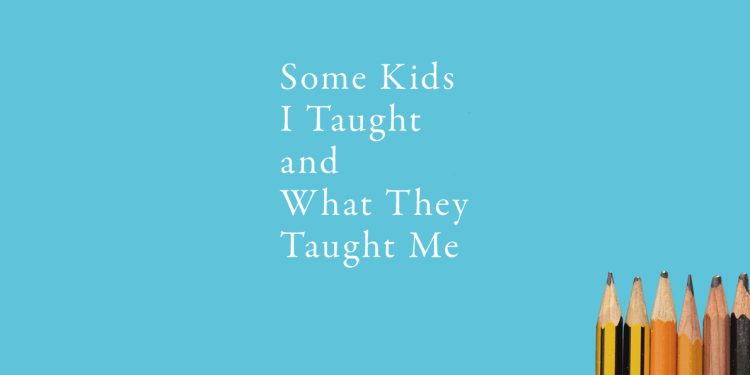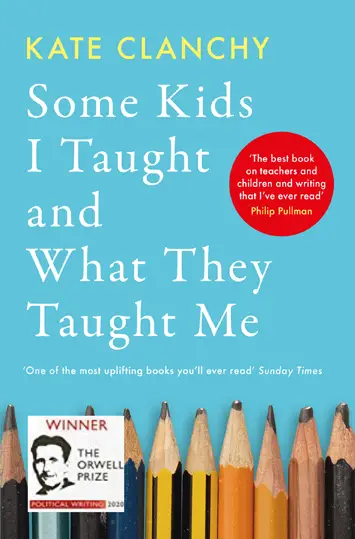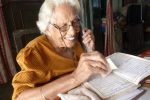Some Kids I Taught and What They Taught Me by Kate Clanchy – Review

By Clare Jenkins
When poet Kate Clanchy first published this warm, engaging and highly instructive memoir in 2019, she couldn’t have dreamt of the Twitter abuse she’d subsequently experience. Having taught in secondary schools for 30 years – including one with 32 languages and “no majority culture” among the students – she must have basked in the rave reviews she initially received, not to mention winning the 2020 Orwell Prize for political writing. Maybe she really could change the world through educating not just adolescents but also adult readers, something she admits she hoped to do.
But then the trolls started their devil’s work – accusing her of racist, classist and ableist stereotypes, attacking her for being an entitled, white, middle-class, left-leaning liberal with patronising views. Her then publisher at Pan Macmillan dropped her like a hot brick, issuing an apology that, as even the middle-class, left-leaning liberal Guardian noted, read like a hostage note: “I now understand I must use my privileged position as a white middle-class gatekeeper with more awareness.” Yep, kill the bitch! Burn the witch!!
Clanchy herself tried apologising but only made matters worse. Independent publisher Swift then stepped in to buy the rights and republish the book, albeit with some amendments, including a revised introduction. And every teacher and parent in the land, not to mention everyone who wants to understand the challenges faced by teachers and the importance of empathy and compassion in the profession, should buy it.
Yes, there are times when you might wish she were a little less bleeding- heart-liberal, and there’s the odd whiff of self-confessed do-gooding, but hell’s teeth, have you ever tried teaching a class of 30 teenagers with different needs? Teenagers from Afghanistan, Lithuania or Nigeria, children of refugees or asylum-seekers, white working-class kids from hugely damaged and damaging backgrounds? Children who self-harm or steal or belong to gangs or do drugs? Children with little or no self-esteem, who become/get someone pregnant at 15 or who are carers for younger siblings or, indeed, for their parents? Children who have experienced things no human being should experience?
Clanchy has faced all of that – and pays tribute to all her fellow teachers who do exactly the same, day in day out, for years on end, in the face of parental, public and political abuse, enabling young people to fulfil, or at least see, their potential. Trying to show them that there is a better world, and that education can be the key to it.
In Clanchy’s case, that education focuses on creative writing, specifically poetry. At the various comprehensives where she has taught (in London, Scotland, Essex and Oxford), she set up Poetry Groups and writing sessions to encourage pupils who might be struggling with other aspects of education.
“Astonishing – and very moving”
The book is divided into topics – Love and Sex, say, or Where We Belong, or Uniform, or Religion (she’s as opposed to single faith schools as she is to grammar schools and gives strong arguments against both). Each chapter is then subdivided into different pupils’ pseudonymous experiences. So, for instance, we learn about her decision (which surely wouldn’t be allowed now) to accompany a newly ‘out’ sixth-former to his first gay club. We learn about Kenyan-born Aadil’s pretence to be Somali so his family can stay safe, and safely, as asylum-seekers in Britain. And about Bangladesh-born cousins Rizia and Rabeya, who write a factually inaccurate teen novel together about an American summer camp. When Clanchy tactfully points out that they’d probably write a better book about girls like themselves, Rabeya replies, “Miss, we are not in books.”
At which point, Clanchy has one of many light-bulb moments: “In my own early reading there had been white bookish girls everywhere, from A Little Princess to I Capture the Castle to Jane Eyre… What if, I thought, what if all my childhood reading, all my beloved novels and stories, had not featured a single person who looked like me or spoke to me? How would I feel if I was not in books?”
So she tells the two girls to write a novel with Bengali girls in it. “There’s clearly a need.”
That’s her modus operandi throughout: if you don’t see yourself in the novels, poems, plays that you read, write one yourself. The results can be astonishing – and very moving. One exercise – starting with the words ‘I don’t remember’ – leads to an outpouring of memories from pupils about their home countries, childhoods, lost relatives. So she sets up an Other Countries Poetry Group. And Rabeya writes this:
My Mother Country
I don’t remember her
In the summer,
Lagoon water sizzling,
The kingfisher leaping,
Or even the sweet honey mangoes
They tell me I used to love.
I don’t remember
Her comforting garment,
Or her saps of date trees, providing the meagre earnings
For those farmers
Out there
In the gulf
Under the calidity of the sun,
Or the mosquitoes
Droning in the monsoon,
Or the tipa tapa of the rain,
On the tin roofs,
Dripping on the window,
I think.
There’s a sobering conversation with teenage Shakila about the human impact of a terrorist bomb in her home town in Afghanistan. A young girl seeing body parts – feet, legs, a head – in the street after the explosion.
“’Miss,’ she says, ‘there was a head. A whole head.’
‘His head?’ I ask. ‘The terrorist’s?’
‘Just,’ she says, ‘you know, a head.’”
Later, Shakila helps mentor other girls, from different backgrounds, including 17-year-old Heya from Damascus, who lost three sisters when a bomb fell on their house. Heya writes a poem about her loss, Clanchy includes it in a poetry anthology, and Heya reads it aloud at the book launch. Other kids she nurtured have won poetry competitions, been commissioned to write poetry for the BBC, had their work set to music, and been included in another anthology, England: Poems from a School.
“Enormous privilege”
 Clanchy’s love of her work comes over loud and clear on every page. She is passionate about creative writing, passionate about teaching, passionate about her students. She acknowledges how much she has learnt from them – about other cultures, other backgrounds, other ways of viewing the world. She has learnt about dyslexia, mental health and illness, about the arguments for the hijab, and arranged and forced marriages. About kids put into a special Inclusion (meaning Exclusion) Unit, kids who – for all the hard work of their teachers and, sometimes, parents – still fall through the cracks into poverty, prison, long-term behavioural issues and permanent school expulsion.
Clanchy’s love of her work comes over loud and clear on every page. She is passionate about creative writing, passionate about teaching, passionate about her students. She acknowledges how much she has learnt from them – about other cultures, other backgrounds, other ways of viewing the world. She has learnt about dyslexia, mental health and illness, about the arguments for the hijab, and arranged and forced marriages. About kids put into a special Inclusion (meaning Exclusion) Unit, kids who – for all the hard work of their teachers and, sometimes, parents – still fall through the cracks into poverty, prison, long-term behavioural issues and permanent school expulsion.
She admits that one of the lessons students like Shakila and Heya teach her is “how white I am. To these young refugees… I am a super-empowered, incredibly lucky member of the world’s ruling class; someone whose ‘papers’ – the visa, passport, work permit, the possession or lack of which very often dominates their family destiny – are perfect, wholly intact.”
And she’s angry about the way successive education policies during her career have sometimes mitigated against student growth, with their relentless tests, narrow curricula, ‘learning objectives’ and straitjacket regulations. Yes, there’s middle-class angst – should she send her own son to the secondary school where she teaches or to the nearby, more academically successful, Catholic school? In the event, he attends her school and does well there – but then transfers to a different sixth form for his chosen A levels because that’s the way the system currently works.
Clanchy knows she’s privileged, but shows that teaching the students she’s taught, in the schools where she’s taught them, has also been an enormous privilege. The result is a hymn of praise to those students and all their many differences. It shows the potential power and joy of diversity – something we should surely all celebrate.
‘Some Kids I Taught and What They Taught Me’ by Kate Clanchy is published by Swift Press, £9.99









